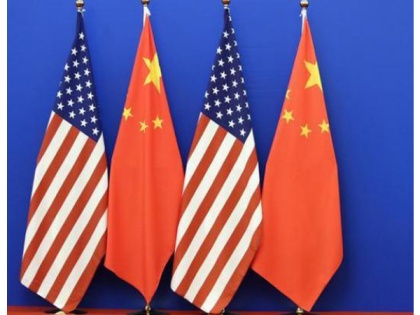US-China information war likely to intensify over Indo-Pacific
By ANI | Published: May 4, 2021 06:23 PM2021-05-04T18:23:49+5:302021-05-04T18:30:13+5:30
With the US military's decision to set up a task force aimed at curbing China's influence and information operations, military and security analysts say that an information war over the Indo-Pacific region is expected to intensify

US-China information war likely to intensify over Indo-Pacific
With the US military's decision to set up a task force aimed at curbing China's influence and information operations, military and security analysts say that an information war over the Indo-Pacific region is expected to intensify.
The creation of the task force in the Indo-Pacific was announced by General Richard Clarke, commander of Special Operations Command in March, who said the US needed to tamp down disinformation by China, South China Morning Post (SCMP) reported.
In the same month, Christopher Maier, acting assistant secretary of defence for special operations, said that the US military would step up countering propaganda, disinformation and deception, force protection and disrupting adversarial influence capabilities.
"The US is looking to know more about the People's Liberation Army (PLA), including the PLA's ability to engage in combat and the development of Chinese military industry," said Song Zhongping, a former PLA instructor and Hong Kong-based military affairs commentator.
Malcolm Davis, a senior analyst in defence strategy and capability at the Australian Strategic Policy Institute, remarked that the special task force reflected US concerns over Chinese media and information operations in relation to public opinion, SCMP reported.
"Information war will intensify as part of China's efforts to weaken US and allied resolve, particularly over Taiwan and in the South China Sea. For the US not to respond would be to hand the operational initiative to China, putting it in a much stronger position to shape the battle space before the use of kinetic force," Davis said.
"So this is part intelligence gathering, and part media operations on the US side, identifying where China's information strategy is focused, and developing counter-responses to blunt its effectiveness," Davis said.
Under the former President Donald Trump's administration, ties between the two countries had deteriorated over issues such as human rights violations in Xinjiang, encroachment on the special status of Hong Kong, accusations of unfair trade practices by Beijing, lack of transparency concerning the pandemic and China's military aggression in various parts of the world.
The US Senate Foreign Relations Committee last month passed sweeping legislation to push back on China on a number of issues, including human rights and its gross economic practices.
The 21-1 panel vote sends The Strategic Competition Act to the floor for a full chamber vote. Senator Rand Paul (Republican from Kentucky) cast the lone vote opposing the legislation, as reported by The Hill.
According to SCMP, US lawmakers are also scrutinising a bill laying out an approach towards competing with Beijing, covering facets from diplomatic strategy, military deployment and competing values, to curbing China's "predatory international economic behaviour".
The US is rethinking the integration of military and non-military instruments of warfare - including cyber and information operations in multiple domains - to influence an opponent's strategic choices and options, said Michael Raska, an assistant professor at the S. Rajaratnam School of International Studies at Nanyang Technological University in Singapore.
( With inputs from ANI )
Disclaimer: This post has been auto-published from an agency feed without any modifications to the text and has not been reviewed by an editor
Open in app